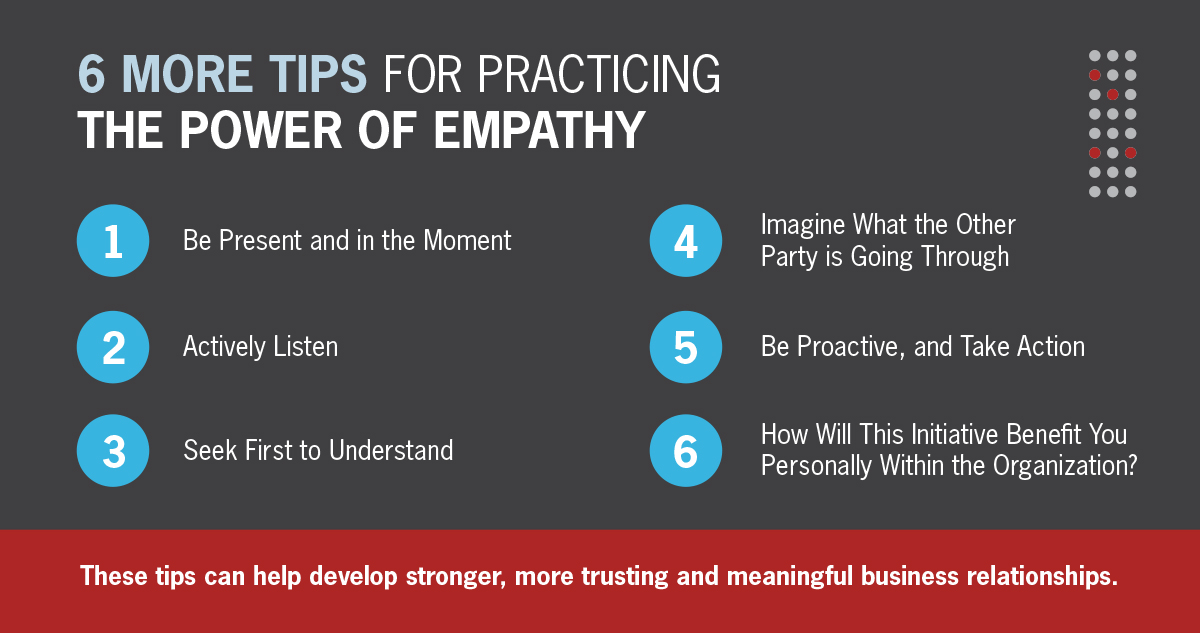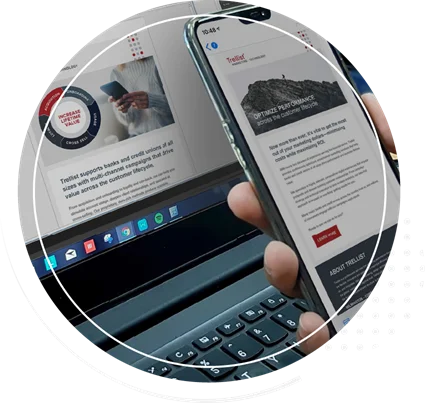
A while back we posted the blog “The Power of Empathy, Part 1: Empathy in Business Networking,”
which pertained to the power of exhibiting empathy when you are meeting businesspeople and prospects for the first time. This article, Part 2, focuses on how to communicate within and treat these relationships after these contacts have become our
clients and customers.
We have established at this point that empathy is our capacity to understand or feel what another person is experiencing from within their frame of reference, i.e., the ability to place oneself in another's shoes.
When it comes to maintaining healthy, long-term, and mutually beneficial relationships, few skills or virtues are more valuable than empathy.
Let’s be honest: business relationships are fragile. Both parties have wants, needs, domains
they wish to protect, and expectations. Many times, large sums of money are changing hands for products and/or services. The success (or failure) of associated initiatives can even sometimes significantly affect someone’s career. So, how we
act and communicate within these relationships is, quite frankly, critical.
Empathy is often viewed as something intangible, a skill that you either have or you don’t. This is not true. Empathy is not a “soft” skill. Empathy
is an often overlooked, yet essential, business skill that can be learned, practiced, and honed.
These six tips can help you develop trust, compassionate empathy, and overall stronger business relationships with your clients.
1. Be present and in the moment.
We live in a fast-paced world of information overload, multi-tasking, being online all day, and a constant stream of distractions. As a symptom of this reality, studies show that people are having a harder time concentrating and are less empathetic today
than they were in decades past. Underscoring the importance of social awareness, this now makes the art of being empathetic all the more valuable and powerful. To develop and exhibit empathy, you’ll need to learn to cultivate “being present”
and “in the moment.” This means being in the here and now and focusing intently on the person in front of you, rather than allowing your mind to wander or allowing yourself to be distracted by unimportant peripheral stimulus. Only by being
present and hyper-attentive to the person you are with can you be empathetic.
Some techniques to cultivate presence are having very clear goals and objectives going into a meeting, preparing a list of questions beforehand (and setting
the expectation at the meeting outset that you hope to address all of them), committing to taking steady notes during the meeting, and remembering that it’s not about you—it’s about your client.
2. Actively listen.
Closely aligned with being present and in the moment, active listening is a communication technique that is used in counseling, training, and conflict resolution. It requires that the listener fully concentrate, understand, respond, and then remember
what is being said. This one skill can vastly improve virtually every relationship you have and may be one of the most valuable skills you will ever learn in your lifetime.
Sometimes we just love to hear ourselves talk. On occasion,
we all enjoy feeling important and showing how smart we are. However, often we come to conversations with assumptions, certain preconceived notions, ideas, thoughts, and beliefs. This causes us to not listen, and to not really hear—to take to
heart—what someone else is saying. This is self-defeating and can even be insulting to others.
To the contrary, hearing what someone is saying as if you’re hearing it for the first time and with a genuine intent to learn
something, will enable you to actively listen. You can practice this skill by listening very attentively to what someone is telling you and by looking for a connection—seeking some common ground—while you listen. Focus completely on that
person and do not get distracted. Paraphrase things the other person is saying, and clarify what they’ve said with thoughtful questions, and you will witness firsthand the power of this skill.
3. Seek first to understand.
One thing we love equally to feeling important is feeling understood. Business, to a large extent, is about problem solving: one party has a challenge, the other aims to solve it. With that in mind, before you can solve a problem, you have to deeply understand what that problem is, why it exists, how it manifested in the first place, and what pain or inconvenience it’s causing your client. Albert Einstein famously said, “If I had an hour to solve a problem, I’d spend 55 minutes thinking about the problem and 5 minutes thinking about solutions.” The lesson? Ask good questions, listen more than you speak, and seek first to understand.
4. Imagine what the other party is going through.
The ability to put yourself in someone else’s shoes is at the core of empathy. When working with a client, seek not only to understand what business objective they want to address, but to truly understand how they feel and think about the situation. What is their motivation? How is their current situation negatively impacting their job, their team, and their goals? Why is this initiative important to their charter and the company mission? What type of qualitative and quantitative improvements will indicate success? Drilling down on such questions will put the focus squarely on your client and convey that you are sensitive to their needs and concerns and are genuinely intent on helping.
5. Be proactive, and take action.
In the business world, when dealing with clients, we often say, “Please let me know if there is anything I can do for you.” There’s nothing wrong with that at its core. However, you are putting the burden on that person to think of something you can do for them and then to actually ask you for it. As an alternative, instead of just making yourself available, just do … something. Be proactive. Make it about them. Maybe there is some relevant data or thought leadership you can provide to your client. Perhaps invite them to a lunch and learn session or give them a Starbucks’ gift card. Give them an unsolicited endorsement on LinkedIn. If, instead of passively asking, you just do something, this will show that you are committed to really making a difference in their business life — not just paying lip service to the topic.
6. How will this initiative benefit you personally within the organization?
I find this question to be unique and effective in a couple of ways. Every company asks about business objectives and goals, which is an important, practical topic to cover. However, though practical, it is impersonal. But when you ask someone how they,
personally and specifically, will benefit, that sets you apart. First, you can safely bet your competition isn’t asking that question. Second, this question conveys that you are interested in the well-being of the person across the table. It
says that not only do you care about the business aspects being discussed, you actually care about the people involved too. This demonstrates emotional maturity, openness, compassion, and most importantly, empathy.
Empathy takes effort.
Like strength training, for instance, it isn’t always fun, easy, or comfortable. Selfless social sensitivity and putting yourself in someone’s shoes can be a challenge, especially when their perspective may differ from yours. That said,
it’s not about being selfless or nice, although these virtues are very positive unto themselves. Empathy is about connection, understanding, and deeper human interaction. And better yet, be encouraged that when you put in the effort and investment,
empathy can be cultivated and the benefits substantial. For instance, these six tips aren’t just about connecting with customers—they can positively impact all parts of your business and personal life with family, friends, employees, partners,
investors, suppliers, and more.
Learn more about how Trellist approaches new and evolving business problems by checking out the rest of our blogs here.












